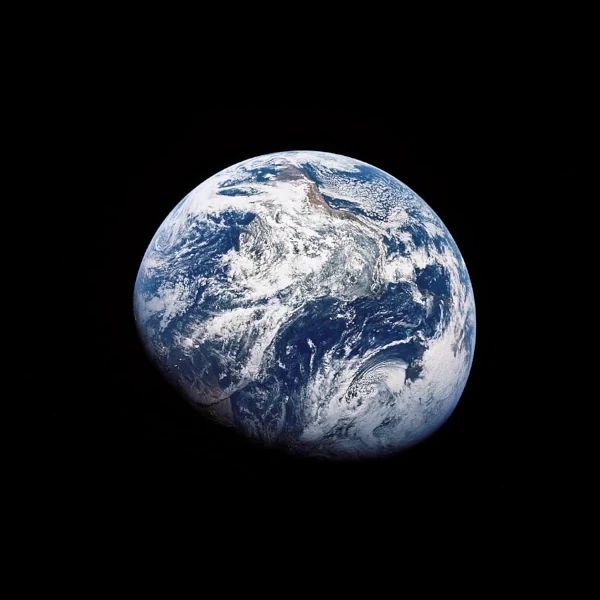
Image description: The movement of our planet marks the passage of time, but the nature of time is one of the greatest mysteries of physics. There is no definition of time, yet we use it in many metaphors. Scientists are increasingly questioning the nature of time, "what is time?" and even "does time exist?" Image source: Apollo 8 (December 1968).
"Time is what happens when nothing happens." Jean Giono (1895-1970).
For a long time, the rotation of the Earth on its axis represented the most precise measurement of "time passing". Everything moves, stillness does not exist. We observe every day that things move, change, and age; something is indeed passing!
Everyone knows what time is, but no one knows what the nature of time is. Yet, we talk about it constantly in the form of metaphors or tautologies. We often confuse time with temporal phenomena and thus create as many definitions of time. Time is linear; it is impossible to relive things in the same way, we never pass through the same point twice. Each moment of our life is marked by a continuous succession of unique events.
Since Einstein, we know that time is space, and our Earth is "tossed" on the four-dimensional fabric of spacetime, like on the surface of a giant trampoline modified by the gravitation of the planets, the Sun, the stars, and the Galaxy.
The Earth is in motion in the vast Universe according to the fluctuations of spacetime. We fall with it into the infinite, drawing a succession of points along ever-changing spirals. We will never pass through this point in spacetime where we are at this moment. This unique place in spacetime belongs to the present and immediately disappears into the past, replaced by a new present moment, a new point on the trampoline of spacetime.
For each observer, all moments are unique. Albert Einstein relativized the absolute character of space and time. Motion causes a slowing down of time. Thus, space and time are linked; space is a piece of time, and time is a piece of space.
The planets, the stars, the galaxies undergo the passage of time. The universe advances, the past can never be relived, and our days are a succession of causes and effects since the "beginning" of the Universe.
Never contradicted by experience, the principle of causality affirms that if a phenomenon (the cause) produces another phenomenon (the effect), the effect cannot precede the cause. This is what makes time linear and not cyclical.
A cyclical time is improbable because even if we were to replay the initial conditions of the birth of the Universe, any tiny modification would lead to unpredictable results in the long term (chaos theory: sensitivity to initial conditions).
It is impossible to relive things in the same way because every phenomenon is the effect of a cause that precedes it. Thanks to the principle of causality, the past is unalterable; it will be eternally true and cannot be modified. We will never pass through the same moment twice.

Image description: Living beings are open thermodynamic systems; they exchange matter and energy with the external environment. The total entropy of a system will only increase indefinitely; this is the second law of thermodynamics. The system can never return to a previous state. Image source: astronoo.com
We are not inert but alive. Our body constantly receives information to analyze, a lot of information, hundreds of billions of pieces of information per second. It retains only a few thousand pieces of information, those that interest us the most, those that will allow us to feed ourselves to stay alive, to evolve in our environment, and to reproduce in order to traverse time.
Selfishly, our senses filter reality, and the information we record is that which concerns our body, our space, and our time. Our conscious brain, aware of death, needs these reference points. It therefore introduces temporality and for this, it needs the past, the present, and the future.
We need to feel time, to hear the ticking of our clocks, to remember the past, to understand the present, and to perceive the future. But the nature of time eludes us; it is not time that we perceive but the variations in entropy, that is, the change, the becoming of things, the aging, the wear and tear, but not time itself.
Entropy is a thermodynamic function that characterizes the "disorder of a system" and establishes the irreversibility of physical phenomena. It is related to the notions of microscopic order and disorder and more precisely to the transition from a disordered state to an even more disordered state. A state is all the more disordered as it can take a greater number of different microscopic states.
Living beings are open dissipative thermodynamic systems of energy. They exchange matter and energy with the external environment and are large consumers of energy. They are subject to the same physical laws as all objects in the universe. The transformation of energy by living beings is based on the principles of thermodynamics.
Degradation, uncertainty, and disorder are part of the concept of entropy. In other words, over time, any system must become disordered; ordered things globally disorganize, and throughout exchanges, energy degrades, and the total entropy of the system increases. Its disorder will only increase indefinitely. This is the second law of thermodynamics.